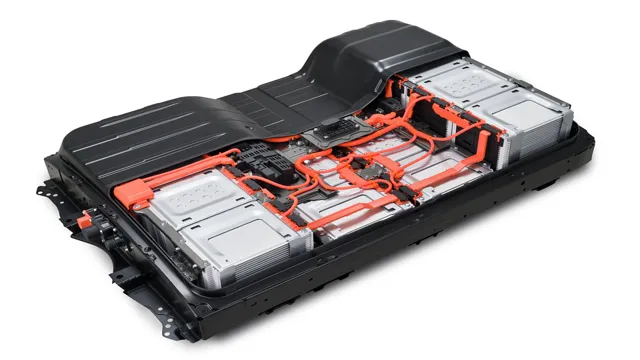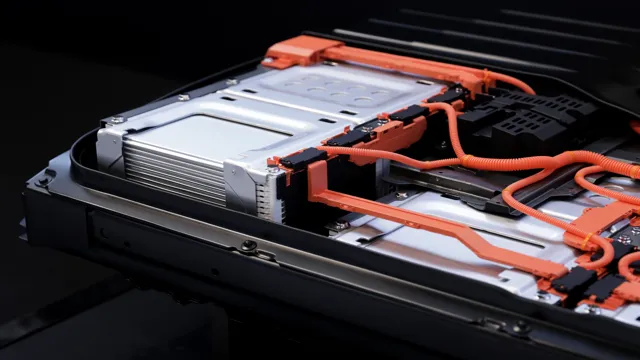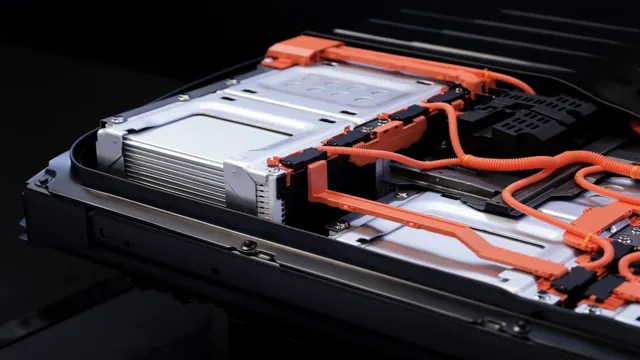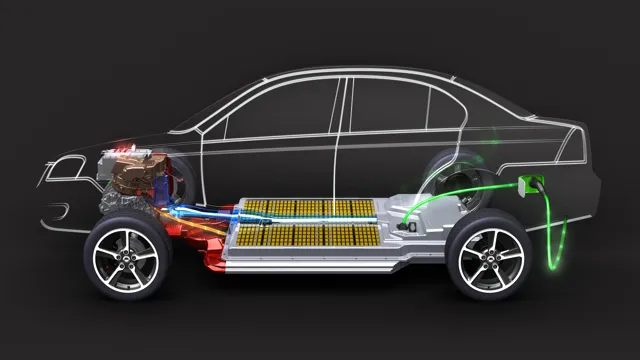Electric Cars on the Rise: Understanding the Definition of Battery Electric Cars
Have you ever wondered what makes electric cars so different from regular gasoline-powered vehicles? Well, the answer lies in their batteries. Battery electric cars, also known as BEVs, are a type of electric vehicle that rely solely on rechargeable batteries for their power. This means that instead of burning fossil fuels like gasoline or diesel, BEVs use stored electricity to power their motors.
It’s like having a giant battery pack that can propel the car forward. But what exactly is a battery? Think of it like a fuel tank, but for electricity. Just like you need to fill up your gas tank when it’s empty, a BEV needs to be recharged once its battery is depleted.
This can be done by plugging the car into a charging station or even your own outlet at home. BEVs are becoming increasingly popular due to their environmentally-friendly nature and cost-efficiency. Plus, they’re generally quiet and offer a smooth ride.
Now that you know what a battery electric car is, you might be wondering how it compares to other types of electric vehicles, like plug-in hybrids or fuel cell cars. Don’t worry, we’ll explore those differences in future posts. But for now, think of BEVs as the purest form of electric vehicle, powered solely by a battery.
So next time you see a sleek, silent BEV on the road, you’ll know exactly what sets it apart from the rest.
What are Battery Electric Cars?
Battery electric cars, or BEVs, are a type of electric vehicle that run entirely on electrical power from rechargeable batteries. They do not rely on any fossil fuel combustion engine, making them clean and eco-friendly. BEVs come with powerful electric motors that convert the stored electrical energy into mechanical power to run the vehicle’s wheels.
The batteries used by BEVs come in different types and capacities, with the most common being lithium-ion batteries. These batteries can store large amounts of energy and are usually charged by plugging them into a power source, such as a charging station or a regular power outlet. With the growing concern of climate change and the need to reduce carbon emissions, battery electric cars are becoming more popular for their sustainability and energy efficiency.
Description of Battery Electric Cars
Battery electric cars are cars that run exclusively on electric power from rechargeable batteries. They differ from hybrid cars that use both electric and fossil fuel engines. Unlike traditional gasoline cars, battery electric cars emit no harmful emissions, making them a more environmentally friendly option.
They are increasingly popular due to their low operating costs and impressive performance capabilities. However, their main downside is their limited driving range, with most models only able to travel around 100 miles on a single charge. This can be a significant drawback for those who require a car for long-distance travel.
Nonetheless, advances in technology are continually being made, and newer models can achieve ranges of around 200-300 miles on a single charge, making them a more feasible option for everyday use. Overall, battery electric cars are a promising solution to environmental concerns, with many experts projecting their increased usage in the coming years.

How Do They Work?
Battery electric cars, also known as BEVs, are vehicles that run on electricity stored in a battery pack. Unlike hybrid vehicles that also have gasoline engines, BEVs solely rely on electric motors to power the vehicle. They are charged by plugging into an external power source, such as a charging station or a household outlet.
BEVs have several advantages over traditional gasoline-powered vehicles, including lower fuel costs and zero tailpipe emissions. However, there are still challenges to widespread adoption, including limited range and longer charging times compared to filling up a gas tank. Despite these challenges, the future looks bright for battery electric cars as advancements in technology continue to improve the driving range and charging times, making them a more practical choice for drivers looking to reduce their environmental impact.
Pros and Cons of Battery Electric Cars
When it comes to defining battery electric cars, they are a type of vehicle that runs solely on electricity, meaning they don’t require gasoline or diesel fuel. Instead, they use rechargeable batteries to power an electric motor that turns the wheels. The advantage of battery electric cars is that they produce zero emissions while driving, which helps to reduce the carbon footprint, resulting in cleaner air and a healthier planet.
Furthermore, electric cars have fewer moving parts, making them easier to maintain, and are less noisy. However, there are some cons to battery electric cars as well. They typically have a shorter range than gasoline-powered cars and require frequent charging, which can be time-consuming and inconvenient.
Also, the upfront cost of purchasing electric cars is high, and there may not be many charging stations available in some areas. Despite these challenges, battery electric cars are becoming more popular as people look for environmentally-friendly ways to get around.
Advantages
Battery electric cars are one of the most popular trends in the automobile industry. They offer several advantages over traditional internal combustion engine vehicles. One of the primary benefits is that they produce no harmful emissions, reducing the carbon footprint and making them eco-friendly.
Electric cars are also much quieter, providing a more peaceful driving experience. Additionally, the cost of running and maintaining an electric car is significantly lower compared to gasoline-powered vehicles. However, there are also some cons to owning a battery electric car, one of which is the limited range.
Electric cars need frequent charging, which can be a hassle for those who rely on long distance travel. Furthermore, the initial cost of an electric car can be much higher compared to a conventional car. Although battery electric cars offer many advantages and green benefits, it’s important to consider the pros and cons before making a final decision.
Disadvantages
Disadvantages of Battery Electric Cars Battery Electric Cars (BEVs) are known for their many benefits, including fuel efficiency, environmental friendliness, and low maintenance costs. However, they also have a few disadvantages that can make them unappealing to some drivers. For one, the range of BEVs is limited, which means they cannot travel as far as traditional gas-powered cars on a single charge.
The charging time is also longer than filling up a gas tank, which can be inconvenient for those who need to travel long distances frequently. Additionally, BEVs have a higher initial cost compared to gas-powered cars, which can be a significant investment for some. Finally, the lack of charging infrastructure in certain areas can make it difficult for BEV drivers to find a charging station when needed.
While these drawbacks may deter some from purchasing a BEV, many still find the benefits outweigh the disadvantages.
Environmental Impact
One of the most significant benefits of battery electric cars is their positive environmental impact. These cars produce zero emissions and are an excellent alternative to conventional vehicles that run on gasoline or diesel fuels. Electric cars help to reduce air pollution and protect the environment by emitting fewer harmful gases and pollutants.
They are also more energy-efficient than traditional cars, using less energy to travel the same distance. On the other hand, one drawback of electric cars is that they rely on electricity, which is mainly generated from non-renewable sources like coal and natural gas. Additionally, the disposal of batteries poses an environmental challenge as they contain toxic and hazardous materials.
However, with the increasing use of renewable energy sources like solar and wind, the environmental benefits of electric cars will further improve. In conclusion, while there are some pros and cons of battery electric cars’ environmental impact, their overall benefits to the environment are significant.
Examples of Battery Electric Cars
Battery electric cars, simply put, are vehicles that rely solely on electric power stored in rechargeable batteries. These types of cars are becoming increasingly popular due to their eco-friendliness and low operating cost compared to traditional gas-powered cars. Tesla is one of the leading manufacturers of battery electric cars, with their flagship Model S, Model X, Model 3, and Model Y.
Hyundai’s Kona Electric and Kia’s Niro EV are often praised for their long-range and affordability, while Chevrolet’s Bolt EV and Nissan’s Leaf are also popular options. With advancements in battery technology, battery electric cars are now able to travel longer distances on a single charge, making them a more practical solution for everyday driving. The future of transportation looks electric, and battery electric cars will continue to play a major role in it.
Tesla Model S
Tesla Model S The Tesla Model S is one of the most popular Battery Electric Cars (BEVs) on the market. This sleek and stylish vehicle boasts zero emissions, making it a top choice for those looking to reduce their carbon footprint. With a range of up to 402 miles on a single charge, the Model S offers impressive versatility and convenience.
The innovative design of the Model S includes advanced features such as fully autonomous driving capabilities, a panoramic glass roof, and eight cameras mounted around the car to provide a 360-degree view. The Model S also offers lightning-fast charging times, with the ability to charge up to 75 miles in just five minutes. Overall, the Tesla Model S is an excellent example of a BEV that combines style, innovation, and sustainability.
Nissan Leaf
The Nissan Leaf is one of the most popular battery electric cars on the market today. With its sleek design, powerful electric motor, and advanced technology features, it has captured the attention of many eco-conscious drivers. This car is powered entirely by electricity and produces zero emissions, making it a great choice for those who want to reduce their carbon footprint and help the environment.
Its range of up to 150 miles on a single charge is impressive and makes it a practical choice for everyday use. The Leaf also comes equipped with a host of safety features, including automatic emergency braking, lane departure warning, and blind-spot monitoring. These features make it easy and safe to navigate the roads, especially in busy traffic.
All in all, the Nissan Leaf is a fantastic example of how battery electric cars can provide a reliable, eco-friendly, and fun driving experience.
Conclusion
In conclusion, battery electric cars are the superheroes of the automotive industry – they’re quiet, efficient, and they emit zero emissions. They’re like the Batman of the streets, silently swooping in to save the environment without anyone even realizing it. With battery electric cars on the rise, it’s clear that the future of transportation is looking bright, and we can all rest easy knowing that our beloved planet is in good hands (or wheels).
“
FAQs
What is the definition of battery electric cars?
Battery electric cars, also known as pure electric cars, are vehicles that run purely on electricity stored in rechargeable batteries.
How do battery electric cars differ from hybrid cars?
Battery electric cars differ from hybrid cars in that they rely solely on electric power, while hybrid cars use a combination of electric and gasoline power to run.
What is the range of battery electric cars?
The range of battery electric cars varies by model, but most can travel between 100-300 miles on a single charge.
How long does it take to charge a battery electric car?
The time it takes to charge a battery electric car depends on the charging method and the car’s battery capacity. With fast chargers, some models can charge up to 80% in 30-60 minutes, while standard home chargers can take 8-12 hours for a full charge.




